Posts by worldrelief
World Relief Applauds Bipartisan Introduction of the Dignity Act
May 23, 2023
CONTACT:
Pinkston Team
wr@pinkston.co
Today, a bipartisan group of congressional leaders led by Rep. Maria Elvira Salazar (R-FL) and Rep. Veronica Escobar (D-TX) introduced the Dignity Act – a broad immigration reform bill that would include an earned path to legal status for qualifying undocumented immigrants with the option to pursue naturalization, an expedited path to citizenship for Dreamers, and reforms to border security and asylum processing.
World Relief celebrates the introduction of this bipartisan bill. As will be the case in any carefully-negotiated consensus legislation, we may have concerns with some elements of the bill, but we are encouraged by this good-faith, bipartisan process that includes many of World Relief’s longstanding immigration policy priorities.
“Legislative reforms to the entire U.S. immigration system are long overdue, but the only path toward broad, durable reforms is through bipartisan cooperation. I’m thankful to Rep. Salazar, Rep. Escobar and the other original cosponsors of this bill for doing the hard work of forging consensus across the partisan lines that for decades have stymied real reforms from passing into law,” said Myal Greene, president and CEO of World Relief. “Consistent with the biblical conviction that all human beings are made in the image of God with inherent dignity and potential, the Dignity Act would allow undocumented immigrants to earn permanent legal status and eventual citizenship if they pay a fine and meet other requirements. I pray that both Republicans and Democrats in Congress will come to the negotiation table to finally realize reforms that both secure our borders and show compassion to immigrants.”
The bill stands in contrast to a partisan bill that narrowly passed the U.S. House of Representatives earlier this month, H.R. 2, which would dramatically roll back existing legal protections for asylum seekers and for unaccompanied children in ways that World Relief believes are morally unacceptable. But unlike a partisan bill that has no chance of being signed into law in the current Congress, the bipartisan Dignity Act addresses the policy priorities of both Republicans and Democrats. We urge members of Congress in both parties to take this bill as a starting point for further negotiation, and urge the Biden administration to play a constructive role in convening good-faith negotiations as well.
As a global Christian humanitarian organization with a long history of partnering with evangelical churches to welcome immigrants to the U.S., World Relief encourages Christians to use their voices to advocate for long-overdue immigration reforms. A study by Lifeway Research last year found that 78% of American evangelicals support proposals that “would both increase border security measures and establish a process so that those immigrants in the U.S. unlawfully could earn permanent legal status and eventually apply for citizenship if they pay a fine, pass a criminal background check, and complete other requirements
during a probationary period.” That represents a 12% increase since 2015. Notably, only 15% of American evangelicals would oppose such a proposal.
“We’ve advocated, mobilized local churches and prayed for many years for many of the policies included within this bill,” observed Matthew Soerens, Vice President of Advocacy and Policy for World Relief. “We’re not naive to the political challenges ahead in forging consensus in a time of deep partisan divides, but we also believe in a God for whom nothing is impossible. We’re both praying and mobilizing for the day when a broad, bipartisan reform, including an earned pathway to citizenship for undocumented immigrants, is signed into law.”
To learn more about World Relief’s programs around the world, visit worldrelief.org.
About World Relief
World Relief is a global Christian humanitarian organization that brings sustainable solutions to the world’s greatest problems – disasters, extreme poverty, violence, oppression, and mass displacement. For over 75 years, we’ve partnered with churches and community leaders in the U.S. and abroad to bring hope, healing and transformation to the most vulnerable.
Learn more at worldrelief.org.
To download a PDF version of this press release, click here.
###
About World Relief
World Relief is a global Christian humanitarian organization whose mission is to empower the local church to serve the most vulnerable. The organization was founded in the aftermath of World War II to respond to the urgent humanitarian needs of war-torn Europe. Since then, for over 75 years, across 100 countries, World Relief has partnered with local churches and communities to develop sustainable, locally-driven solutions to some of the world’s greatest problems. To learn more, visit worldrelief.org.
4 Things to Know About Recent Conflict in Democratic Republic of the Congo
A new surge of conflict in Democratic Republic of the Congo is exacerbating one of the most neglected displacement crises in the world.
Recently, our team visited one of the large camps for internally displaced people (IDP) located on the outskirts of Goma. We spoke with pastors and members of World Relief’s Church Empowerment Zones who had been displaced.
We talked with women and youth, as well as church leaders and municipal authorities who are handling displacement issues. Everywhere we went, people expressed deep sorrow for the families who have lost loved ones due to the cholera epidemic in the camps, for the sisters and wives who have been raped amidst the conflict, for the thousands of children who cannot go to school and are stuck on the main roads with their families.
In all my years of working in the humanitarian and disaster response sector, I have witnessed terrible misery and despair. But what is currently happening in DR Congo is truly mind-boggling. For all those in these camps who have been displaced many times before, they are remembering past conflicts and displacements with great vividness.
While the crisis is heartbreaking, the long slow work of change continues taking shape. At World Relief we’re committed to assisting the local pastors, activists and community members who are fighting for change within their own communities.
Today, we’re sharing four things you need to know about the most recent conflict in Democratic Republic of the Congo and why it matters to World Relief. Let’s dive in.
1. The current conflict is centered in the North Kivu province, near Goma City.
In August 2022, clashes resumed between DR Congo’s military and rebel group M23. For the last decade, the rebel group had largely been held at bay. But the resurgence of violence triggered a new wave of displacement, violence and hunger in the country’s North Kivu province.
The cause of this conflict and the ongoing driving factors are incredibly complex and hotly debated. Since fighting began, the M23 has been active in a large portion of the North Kivu province, surrounding the capital of Goma. In February, the group advanced toward the city causing widespread panic in the region. While they did not reach the city and a ceasefire was put in place, many continue to live in fear and uncertainty.
2. More than 5.5 million people have been displaced as a result of the conflict.
Most of these families and individuals are now living in both formal and informal settlements for internally displaced people (IDPs).
Basic services including access to food and water, are scarce in camps. A recent report by the International Red Cross indicates that 93% of IDPs recently settled in camps in and around Goma are in dire need of essential household items like blankets, cookware and fabric.
Over the last year, education has been disrupted for more than 600,000 children in North Kivu.
Prior to this conflict, many of these individuals and families were living successful self-sustaining lives as farmers, traders, transporters, etc. But in the rush to escape the violence, they left everything behind and it’s unclear when it will be safe to return to their homes.
3. People in DR Congo desperately want peace.
While DR Congo is home to more than 100 armed groups operating in the eastern region, citizens are actively finding ways to come together and creatively pursue peace.
Artists in Goma are painting murals to amplify their call for peace and urge people to reject violence. Women across eastern DR Congo are mobilizing their communities, strengthening connections between local authorities and the communities in which they work, documenting human rights abuses and holding perpetrators accountable.
Though the loudest and most consistent narrative coming out of DR Congo is one of war and pain, the strength, resolve and collective push for development and healing must not be overlooked. In fact, much of World Relief’s work in the region is spearheaded by local pastors and community members who are working together to unite churches and build peace.
4. World Relief has been partnering with communities in DR Congo for more than two decades and staff are responding now.
Since 2001, World Relief has been working to address the root causes of conflict in Democratic Republic of the Congo and facilitate stability and healing in the country. Village Peace Committees were piloted in the early 2000s as part of an ongoing initiative to disrupt cycles of revenge that have the potential to escalate to violence by focusing on reconciliation and forgiveness.
Today, we’re responding in the hardest hit regions near Goma providing food and non-food items as well as hygiene and sanitation aid.
In partnership with local church groups, IDP committees and other NGOs, World Relief is identifying those facing the most acute hunger needs, prioritizing female-led households, people with disabilities and the elderly. Monthly food distributions, consisting of beans, maize, oil and salt, will provide for 100% of household emergency nutritional needs based on internationally-recognized standards.
Learn More
DR Congo faces one of the most complex and neglected humanitarian crises of our day. While this may not be making headline news, it’s affecting millions of people. Their stories matter and we believe it’s important to stay informed beyond the headlines.
Linked below are several stories from DR Congo and from Congolese refugees who are now living in the United States, as well as a few recommended resources for learning more about the history of DR Congo.
Stories from DR Congo:
- Change United to Bring Peace and Restoration
- World Relief DR Congo is Building Resilience from Ashes
- Global Peace Starts With Us
- Frontline Report: Democratic Republic of Congo
Congolese Refugee Stories
- Worth the Wait: A Story of Faith, Hope and Perseverance Despite the Odds
- From DRC to the 253: A Blacklisted Journalist Hasn’t Given Up Working or a Better Congo
- Rebuilding Welcome in Memphis
Learn More About DR Congo

Charles Franzén has been working in humanitarian and disaster response sector for more than 25 years. Prior to assuming the role of Humanitarian and Disaster Response Director at World Relief, he served as the Country Director in Democratic Republic of Congo for five years.
World Relief Southern California to Host Grand Opening Celebration for New San Diego Office
May 11, 2023
CONTACT:
Pinkston Team
wr@pinkston.co
San Diego, CA – World Relief Southern California will host a grand opening celebration for a new office location in San Diego on Saturday, May 13 at 6565 Balboa Avenue from 11 a.m PST to 1 p.m PST. The new location will complement World Relief’s long-standing office in Orange County by providing services that both welcome immigrants and refugees and empower them to integrate into their new communities.
“World Relief SoCal is thrilled to announce the opening of our new office location in San Diego as we expand our efforts to live out God’s heart for displaced people by creating a community of welcome for our newly arriving neighbors,” said Jane Register, the San Diego Program Director of World Relief Southern California. “At World Relief, we envision a San Diego where refugees and immigrants can thrive and flourish.”
World Relief’s San Diego office will offer case management aid, along with Immigration Legal Services. Additionally, as in all World Relief locations, the new San Diego office will work closely with local churches and volunteers to provide community-based services for immigrant families, including Good Neighbor teams, host homes, tutoring, and mentorship.
“For more than 40 years, World Relief has partnered with local churches to welcome refugees, asylum seekers and other immigrants to Southern California through our Orange County office,” said Aerlande Wontamo, Senior Vice President of US Programs at World Relief. “We’re excited to now have this new physical space from which to serve San Diego County at a time when there is such significant need for those seeking protection, freedom and opportunity in the United States.”
The World Relief San Diego grand opening event will be open to the general public, as well as the press. The celebration is a community-wide grand opening for neighboring businesses as well as the kick-off event for Clairemont’s 2nd Saturdays monthly pop-up shop that features local businesses. It will include food trucks, bounce houses, pop-up shops, and more.
“For the last three years we have been mobilizing San Diego churches to both welcome and walk alongside newly arrived immigrants in the Borderlands of San Diego,” said Heather Kwak, the Office Director of World Relief Southern California. “We are glad to take this next step in opening an additional office location that will allow more communities to welcome new neighbors and meet the needs of the immigrant communities.”
To learn more about World Relief’s work in Southern California and how to get involved, please visit worldrelief.org/socal.
To download a PDF version of this press release, click here.
###
About World Relief
World Relief is a global Christian humanitarian organization whose mission is to empower the local church to serve the most vulnerable. The organization was founded in the aftermath of World War II to respond to the urgent humanitarian needs of war-torn Europe. Since then, for over 75 years, across 100 countries, World Relief has partnered with local churches and communities to develop sustainable, locally-driven solutions to some of the world’s greatest problems. To learn more, visit worldrelief.org.
Social Emotional Learning Equips Refugee Children and Their Families to Thrive
At World Relief, we are committed to advocating for refugees the opportunity to legally seek refuge in the United States. But our work doesn’t end there. We know that serving the refugee community requires caring for the whole person and their families.
As part of our bold vision to move Forward Together, we are determined to Go Deeper in our care for our refugee and other immigrant neighbors by addressing root causes of vulnerability and expanding our expertise in mental health.
Carrie Woodward, Foundations Partnerships Manager for World Relief Chicagoland, breaks down one of the trauma-informed mental health strategies: Social Emotional Learning.
At just four years old, Sam arrived in the United States with his family. Upon arrival, they were welcomed by World Relief Chicagoland. Like other refugees, the family arrived with hope and dreams for their future. the chance to rebuild in the United States did not erase the impact left by tragedy and trauma — even for a young child like Sam.
Refugee children carry their complex emotions and traumatic histories with them. This can make getting to a place of stability and happiness very challenging.
Even after coming to the U.S. Sam’s body and mind were marked by the trauma of his past, and he struggled to adjust. He had a lot of emotions that he did not understand or know how to express – so he lashed out in frustration. This left his parents feeling exhausted and overwhelmed, unsure of what to do. His mother told World Relief, “I feel helpless.”
The Challenges Refugee Children and Youth Face
For children, whose brains are still developing, the resettlement experience itself can be retraumatizing as they encounter language barriers, difficulty navigating community resources, lack of relational support and culture shock. Many refugees come from cultures where discussing mental health is taboo. This often means that busy parents like Sam’s who are processing their own trauma may not know how to support their children in recovering too.
Thankfully, with the help of community partners and volunteers, World Relief Chicagoland is equipping parents and children to grow and thrive through Social Emotional Learning (SEL).
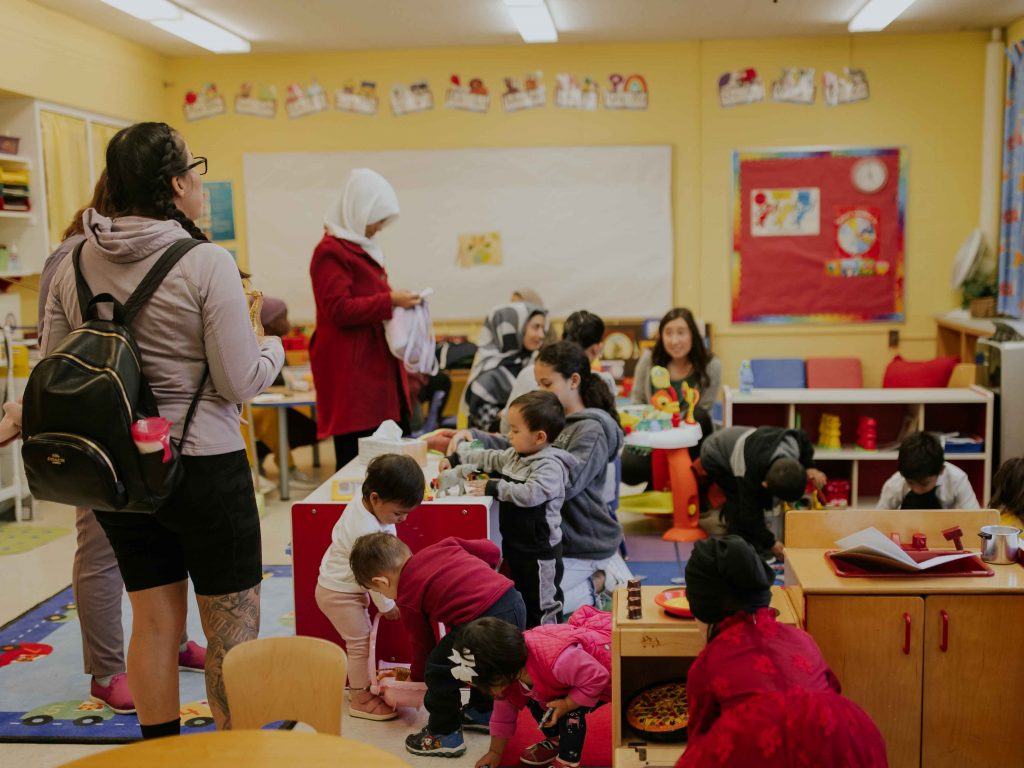
How Social Emotional Learning Changes Children’s Lives
Refugee children have often experienced chronic stress for months or even years at a time. Their stories are often marked with violence, poverty, death of loved ones and displacement. These factors create complex thoughts and feelings that can feel scary to explore. Yet, processing these emotions is key to moving forward.
Social Emotional Learning helps children process by focusing on five areas that impact every aspect of life: self-awareness, self-management, responsible decision-making, relationship skills, and social awareness.
Each of these areas impacts a child’s self-confidence, relationships and ability to cope with daily stressors. Research has shown that when compared to students who did not participate in SEL, those who engaged with SEL activities:
- Had better grades
- Showed more skills for managing anxiety and depression
- Behaved better in a classroom setting
- Expressed better attitudes towards themselves and others
These impacts have long-term, positive effects. One analysis showed that students who participated in SEL programs gained social emotional skills that led to higher levels of well-being 18 years later.
What Does SEL Look Like At World Relief?
World Relief Chicagoland incorporates SEL into age-appropriate activities such as:
- 10-minute guided check-ins to identify and reflect on how their bodies are feeling
- Writing, drawing, or speaking “I am” statements. Saying affirmations like “I am good at basketball!” or “I am a great big sister!” can build self-confidence
- Using a chart of expressive emojis to help preschoolers identify and describe feelings
- Coloring pictures in response to prompts like “Show us your family” or “Show your home
SEL is part of a holistic approach to mental health that addresses the specific emotional needs of immigrant and refugee youth.
“Equipping refugee children with the tools and treatment they need to adapt and grow through trauma forges a pathway for them to embrace emotion and learn how to process it in a way that feels safe and organic to their developmental level,” said Katie Schnizlein, Early Childhood Program Coordinator at World Relief Chicagoland. “This breaks down the barriers of layered emotion and devastating trauma…as they grow into the rest of life.”
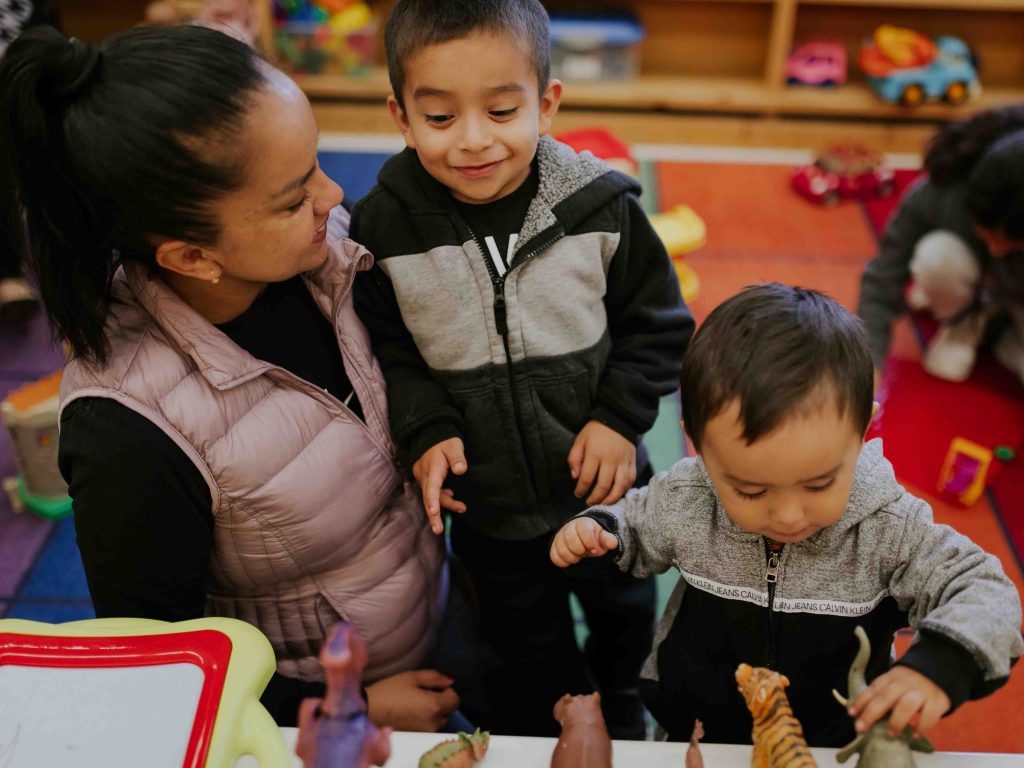
Preparing Children for Life
Ultimately, Katie says, “SEL ensures that children have services that cover mind, body and soul. Through SEL, children have the ability to grow in agency, autonomy, self-awareness, emotional regulation and the art of fitting into the world around them.”
In Sam’s case, SEL is part of the answer to the pain and the helplessness his parents felt.
Shortly after they arrived, Sam started attending a preschool and participating in World Relief’s Children & Youth program. He gained structure and relational support through his tutor and SEL activities, while his mother joined a World Relief-facilitated parenting group where she learned strategies to support her son socially and emotionally.
Thanks to this support system, now at five years old, Sam plays well with friends, is learning quickly in school and is working on naming and describing his emotions.
Read more about how we are going further and deeper to create lasting change and helping families thrive. Follow us on Facebook, Instagram or LinkedIn.

Carrie Woodward joined World Relief in 2021 in a role that engages foundation and business partners throughout the Chicago area. She studied community development and history at Covenant College. This education still informs her passion for asking questions and desire to find evidence-based ways to help communities flourish. Prior to coming to World Relief, Carrie worked for an international development organization and an academic research lab in Arizona. She is an avid reader, podcast-listener, and explorer of Chicago’s many unique neighborhoods. You can often find her playing pickleball or walking by Lake Michigan.
What’s Happening in Sudan?
By now, we know you’ve seen the news coming out of Sudan. On Saturday, April 15, heavy fighting broke out between two military forces under the command of General Abdel Fattah al-Burhan (SAF) and General Mohammed Hamdan Dagalo (RSF), also known as General Hemeti.
While the fighting started in Khartoum, Sudan’s capital city, it has since spread throughout the country causing food, fuel and water shortages in some areas.
Here’s What’s Happening Now
As we’re writing, at least 512 deaths and more than 4,200 injuries have been reported. These numbers are growing daily.
We’re grateful to report that all of our in-country staff are safe and accounted for. They are sheltering in place and checking in on one another while they wait for the fighting to subside.
At this time, humanitarian activities have been paused to keep staff from World Relief and other NGOs safe. USAID has set up a rapid response team in Nairobi to assess the situation and provide emergency aid to people fleeing into the neighboring countries of Chad and South Sudan.
As you might recall, World Relief recently opened its newest office in Chad. The location of our office there puts us in close proximity to Sudanese refugees who are fleeing. At this time, we do not know if a response in Chad will be possible, but our teams are monitoring the situation and staying open to needs as they arise.
Why is This Happening?
This current conflict can be traced back to April 2019 when Sudanese protestors peacefully took to the streets and removed former President Omar al-Bashir. Following the coup, a military-led council took power, prompting another series of protests which have continued into the present day. We shared more about this in a previous post about some of our world’s most neglected crises.
While the latest conflict is most certainly a setback for Sudan, we remain hopeful and committed to long-term development in Sudan and have a long history of working alongside local partners there. Josh Meares, World Relief Sudan Country Director said:
“We do not know what the future holds for Sudan… It is a nation that deserves better than this, and we have a great staff there who are capable of leading the country into a better future if given the chance. We will continue to stand together with and for the most vulnerable.”
Why Does This Matter to Me and World Relief?
Sudan has long been a crossroads between the Middle East and Africa. Though rich in cultures and resources, decades of colonization, civil conflict and climate disasters have made Sudan one of the most vulnerable countries on earth.
Prior to this most recent conflict, 3 million people were already living as internally displaced in Sudan, and 15 million were at risk of acute food insecurity. The return to conflict is likely to exacerbate an already difficult situation for people experiencing the greatest vulnerability.
World Relief has been on the ground in Sudan, working to address these problems since 2004. Outside the U.S., Sudan is our largest country of operation with more than 345 staff who are committed to building flourishing communities and moving lasting change forward.
In 2022 alone, the team reached more than 533,000 men, women and children in Sudan with life-transforming resources, training and care.
It Matters in the U.S., Too
Not only does World Relief work in Sudan, but we have a rich history of welcoming refugees from Sudan to communities across the United States.
You may remember reading about people like Darelsalam who came to the U.S. when she was 14 years old, or Ibrahim who arrived in North Carolina after being separated from his family for 10 years.
Over the years, World Relief has welcomed more than 2,000 Sudanese refugees to the U.S. — this number includes people from both Sudan and South Sudan, which gained independence in 2011 — and we currently have many Sudanese staff who work across our U.S. offices.
Much like the conflict in Ukraine, our connections in Sudan stretch across oceans, reminding us that the lives we live and the challenges we face are deeply connected and inextricably linked. We are grateful for the ways you have joined us in praying for Sudan and ask you to continue praying in the midst of a situation that is changing daily.

Rachel Clair is a Content Manager at World Relief. Alongside an amazing team of marketing colleagues, she manages the curation and creation of written and multi-media content for World Relief’s global platforms. With more than 10 years of experience creating content for churches and non-profits, she is passionate about developing content that challenges both individuals and communities to lean into all of whom God created them to be. She holds a BFA from Stephens College and is currently participating in a spiritual formation cohort through the Transforming Center in Wheaton, IL.
How Climate Change is Impacting Health and Nutrition in Rwanda
Poor communities are often on the frontlines of battling climate change. Many depend on climate-related industries like farming for food and livelihoods, and when climate disasters strike — whether flooding, drought, violent storms or extreme temperatures — there’s little economic margin to rebuild and adapt.
While the economic effects of climate instability are severe among poor communities, the negative repercussions don’t stop there. Climate change and adverse weather events also have a cascading, detrimental impact on health as communities experiencing poverty are at greater risk of disease, injuries and hunger.
The Struggle to Provide
We’ve seen the impacts of climate change on health first-hand in places like Bambiro village in Rwanda, where rising temperatures, extended dry seasons and heavier, less predictable rainy seasons have taken their toll on couples like Epiphanie and Jeremy.
As the water sources they had historically relied on shrank and became dirtier with each dry season, the farming couple could no longer earn a living by growing and selling crops as their elders had. In order to get by and afford food for their children, Epiphanie and Jeremy picked up odd jobs. They washed clothes and made mud bricks to buy potatoes, cornmeal and beans.
Although they wished to provide better, more diverse foods for their children, it seemed impossible. Animal proteins like eggs, fish, meat or milk were too expensive. In fact, when Jeremy was first asked whether he could buy these for his family, he laughed, saying, “I guess you are joking! Where can we get money to buy animal sources of food? Those are reserved for rich people.”
Sadly, when Epiphanie was pregnant with their third child, she noticed that her second born, Aphrodis, was weak. He was often ill and could not stand on his feet at age three. He was suffering from malnutrition.
The Help of a Neighbor
Epiphanie and Jeremy are not the only ones facing challenging circumstances like these. About 80% of the global population who are most at risk of hunger due to climate change are farming families living in Sub-Saharan Africa, South Asia and Southeast Asia.
Yet, even as they are not alone in the challenges they face, they’re also not alone in finding solutions.
In collaboration with UNICEF and The Rwandan national government, World Relief Rwanda connected Jeremy and Epiphanie to a neighbor, Jean Claude, who had faced similar circumstances.
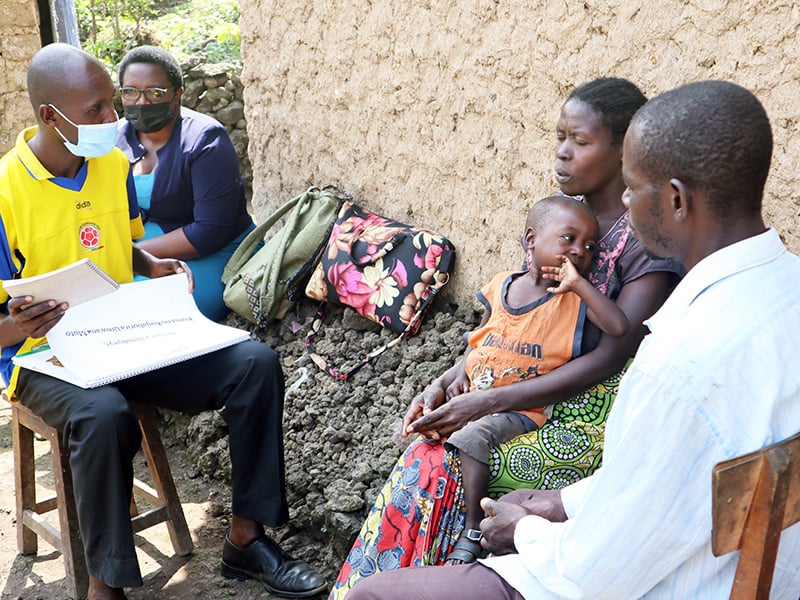
Jean Claude had been selected and trained as a peer supporter through the Abarinzi B’imikurire Myiza (ABM), or “The Guardians of Good Growth,” project. ABM equips community and church leaders with knowledge and tools to help improve maternal, infant and child nutrition in Rwanda through peer-to-peer learning.
As part of the program, Jean Claude received training in food selection and preparation, child feeding practices, the importance of father involvement in child health and nutrition and household hygiene and sanitation.
Equipped with this knowledge, Jean Claude visited Epiphanie and Jeremy frequently to share what he had learned. He helped them plant and tend a kitchen garden capable of growing nutritious food with little maintenance and water. He also provided coaching on healthy practices for feeding a growing family. Within four months, Epiphanie and Jeremy had a garden full of mature, leafy green vegetables!
They were especially amazed that the water from their hand washing could sustain the garden in the dry season, and that the crops would endure even heavy rains.
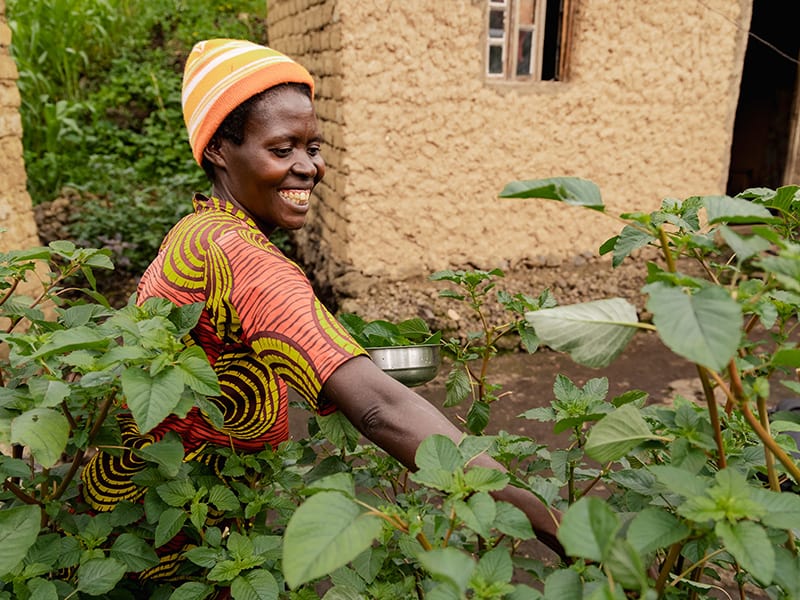
Jean Claude also influenced Jeremy to change the way he spent the money he earned from odd jobs. “I used to spend money buying beer, sugar canes and ignore purchasing nutritious food for my family,” Jeremy explained. “After being trained on kitchen gardening, food preparation and food selection, I changed my priorities. I no longer buy alcohol in replacement of food. I try my best to provide different kinds of food varieties to my family on a daily basis. My wife and children need it, as well as me.”
Creating Climate Resilience Together
Now, Epiphanie and Jeremy are seeing the health of their family transformed in spite of the impacts of climate change. With more vegetables, protein and nutrients in his diet, Aphrodis has grown stronger and now runs around playing with other children.
Together, we have reached approximately 1,456 children like Aphrodis through ABM. Among them, we have seen a 20.9% increase in children ages 6 to 23 months consuming more frequent and diverse meals. We have also seen significant improvements in hygiene practices — among those who received peer-to-peer coaching from volunteers like Jean Claude, over 95% say they wash their hands at key moments, as compared to only 45% in the control group.
While Epiphanie and Jeremy’s lives are still impacted by a changing climate, they are raising healthy children and coping well, surrounded by a community of support thanks to Jean Claude, World Relief and generous people like you.
Read more about the impacts of climate change on poorer communities and how World Relief is responding.
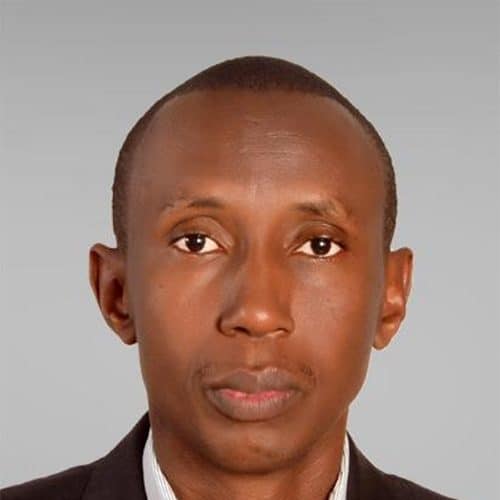
James Munanura is the Senior Manager for Health and Social Protection at World Relief Rwanda. With a research background at the University of Rwanda and Makerere University in Uganda, he provides leadership and technical support to nutrition and health related projects. He assisted with the development and direct management of the peer-to-peer Abarinzi B’imikurire Myiza project.
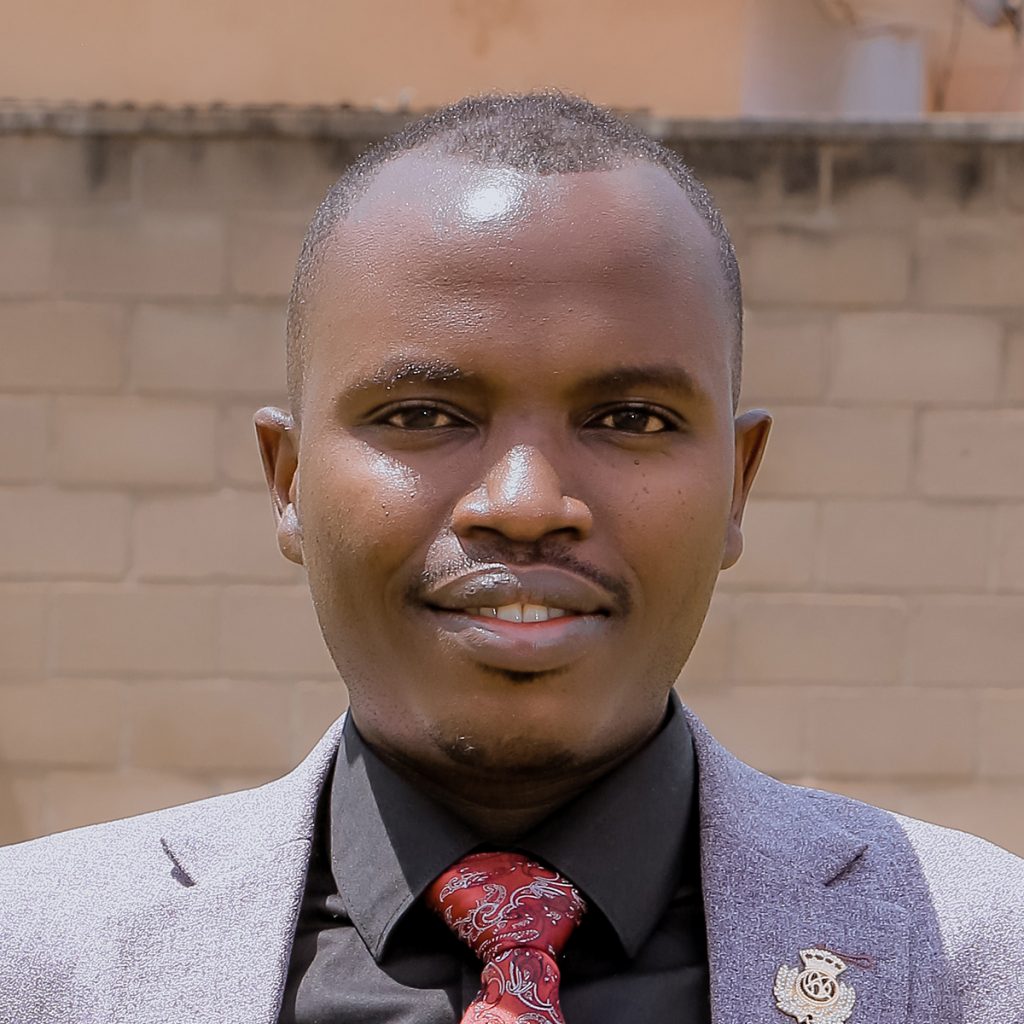
Jean Paul Niyitanga is the Communications and Operations Coordinator at World Relief Rwanda for the USAID-supported SCOPE Project. With a background in Journalism and Communications and a passion for serving the vulnerable, he began working at World Relief Rwanda in 2021. He has also served as a Communications Coordinator for UN-funded projects, including the Acceleration of Integrated Social Protection Interventions in Rwanda (AISPR) project and Maternal Infant and Young Child Nutrition (MIYCN) project.

Emily Kankindi is the Communications and Documentation Unit Coordinator at World Relief Rwanda and is also serving as acting Program Officer for Burundi, Rwanda and Kenya. She started with World Relief in 2005 and has been growing through different roles while pursuing a career in creative communications. Driven by a mission to serve the most vulnerable, Emily has a passion for telling stories of impact and using all forms of communication to inspire others to care for and serve those in need. Her educational background is in marketing and travel operations.
How To Create Change That Lasts
It was a late afternoon in 2017 when we pulled up in front of the giant structure. Eight hours of driving off-road through rock, sand and empty riverbeds had left our team sore and tired, yet the sight alone was enough to shake us from our weariness. In front of us, upon the western shore of Lake Turkana, stood what appeared to be a factory — disheveled, empty and eerily silent.
Following the Sahelian drought of the mid-1980s, massive famine devastated the Turkana region. As is so often the case with large-scale global disasters, the initial compassion surge propelled aid rapidly into the region.
International organizations set up food distributions, medical teams flew in to staff temporary feeding clinics and the Turkana people were once again shown that when things get just bad enough, Western forces will undoubtedly swoop in and try to save the day.
That day, we witnessed one of these examples, as it blocked the blistering rays of afternoon sun from our faces. Twenty years and 150 million U.S. dollars later, a fishery had been completed for the people of Turkana. Its promise? To prevent the people of the region from ever facing starvation again. The reality? A tragic landmark of good intentions gone wrong. The people of Turkana, you see, do not eat fish.
The Elephant in the Room
In his book, When Helping Hurts, Steve Corbett recounts an old African fable:
Elephant and Mouse were best friends. One day Elephant said, “Mouse, let’s have a party!” Animals gathered from far and near. They ate. They drank. They sang. And they danced. And nobody celebrated more and danced harder than Elephant. After the party was over, Elephant exclaimed, “Mouse, did you ever go to a better party? What a blast!” But Mouse did not answer. “Mouse, where are you?” Elephant called. He looked around for his friend, and then shrank back in horror. There at Elephant’s feet lay Mouse. His little body was ground into the dirt. He had been smashed by the big feet of his exuberant friend, Elephant.
Western missions and aid interventions, Corbett writes, are “like dancing with an Elephant. Elephant does not mean to do harm, but he [doesn’t] understand the effects he [is] having on Mouse.”
Sadly, the example of the fishery in Turkana is a tangible manifestation of this fable. It seems that every year we hear horror stories of time and money poured into well-meaning aid interventions that fail to solve the problems they intended to, create damaging patterns of dependency or, worst of all, create bigger problems for their intended beneficiaries.
World Relief Chooses a Different Path
These well-intentioned interventions, while tragic, have taught us important lessons. In fact, they are a central part of how World Relief developed our model of relief and development. We understand that lasting change comes not with quick fixes or band-aid solutions, but through a deep understanding of the unique beliefs, cultural traditions, resources and needs of the communities in which we work.
Such an approach ensures that in places like northern Turkana, we understand that this nomadic, pastoralist community survives on a diet of meat, milk and blood, and that asking them to eat fish — a species they believe are directly related to snakes and associate with danger — is not a quick fix, even in cases of famine.
In seeking to fight against famine in Turkana, we have worked closely with local churches and leaders to brainstorm creative solutions to combat malnutrition.
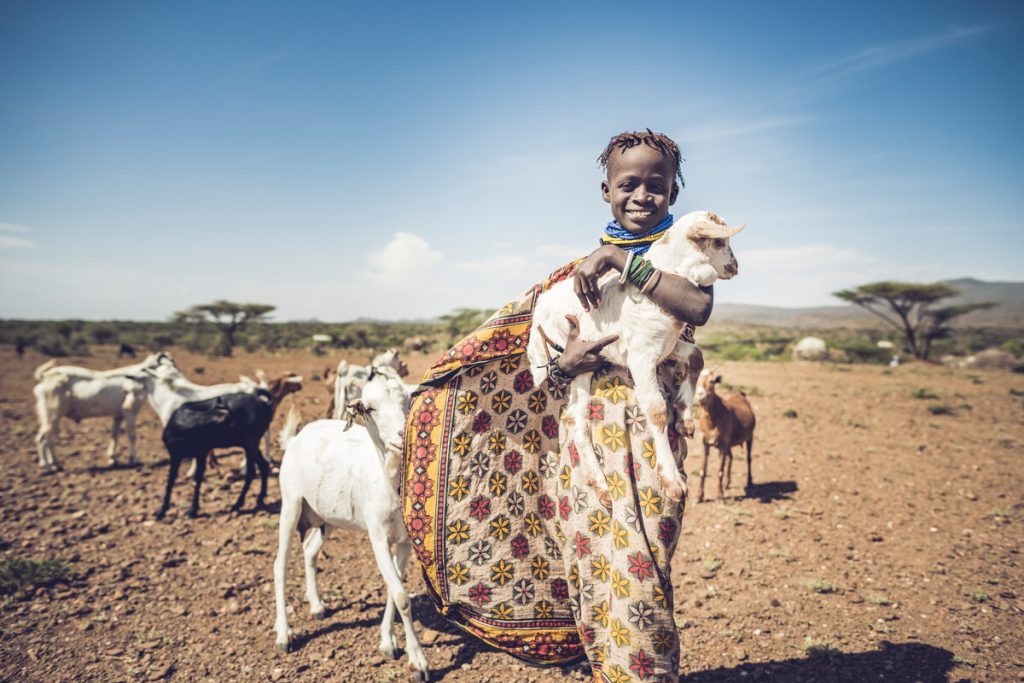
Over the last 12 years, we’ve developed a robust agricultural program in the region that helps expand and diversify the Turkana diet beyond traditional food sources, as well as teach desert farming techniques to help conserve water.
We’ve also bred drought-resistant goats that can survive for longer periods of time without water and launched poultry farming and beekeeping groups that are not only helping the people of Turkana diversify their diets, but also earn income from sustainable food sources. These innovative, culturally-relevant solutions work for the unique challenges and needs of the population and have saved lives in the face of more recent famine and drought.
Grassroots interventions like the ones in Turkana not only honor local knowledge, culture and community resources, but they also pave the way to break the cycle of Western aid that disempowers so many communities in the developing world.
Becoming a Better Partner
In 2010, African economist Dambisa Moyo wrote in her book, Dead Aid, about the broken systems that keep many communities trapped in cycles of dependence on outside aid:
“Africa is addicted to aid. For the past sixty years it has been fed aid. Like any addict it needs and depends on its regular fix, finding it hard, if not impossible, to contemplate existence in an aid-less world. In Africa, the West has found its perfect client to deal to.”
These words, though difficult and perhaps a bit controversial, echo all too true for many development practitioners who frequently hear petitions for food and money when first entering new communities.
It’s also precisely why, when we first enter communities, we begin by bringing local churches together to discuss the ways in which they can work together to solve their own problems. In fact, local pastors, community leaders and a global network of over 95,000 local volunteers, are responsible for the implementation of our programs around the world.
What’s more, 95% of our staff are local to the communities in which they work. Not only do they have an inside voice and understanding that no outside organization can bring, they also bring a passionate commitment for seeing their communities thrive. They will remain in their communities long after we depart — creating, leading and sustaining community efforts toward change.
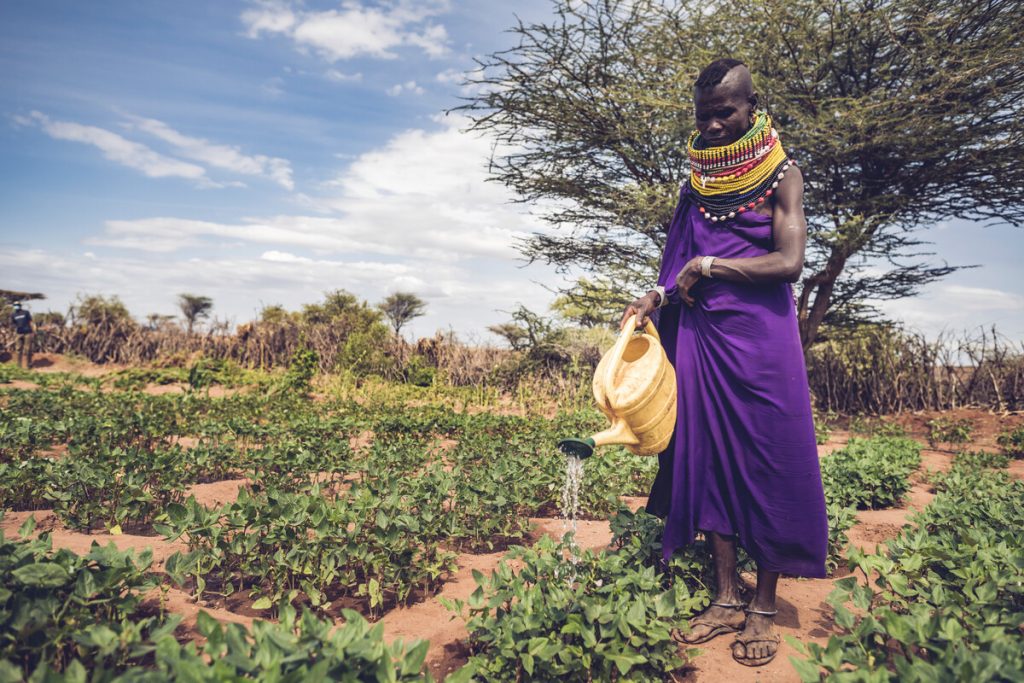
World Relief’s Commitment to Lasting Change
Our world today is obsessed with quick fixes, but at World Relief, we’re fighting for change that lasts. Today, drought is once again threatening severe famine as Turkana. What’s more, the war in Ukraine has caused food prices to spike and rates of malnutrition have increased among children.
And yet, in the imdst of renewed crisis, local churches are rising to the occasion, meeting needs and developing solutions to care for those who need it. Micah Kachoi, World Relief Kenya’s Church Empowerment Zone Coordinator in Turkana said:
“[Churches] are thinking outside the box and asking, ‘What can we do?’
Despite the food shortage and drought, churches are still reaching out to identify the vulnerable people within their communities and mobilizing resources like food, clothing and medical care to support large populations of people who are suffering.”
At World Relief, we refuse to pour time, resources and money into short-term, misdirected solutions in efforts to address complex long-term problems. We believe the biggest problems of our world — disasters, extreme poverty, violence, oppression and mass displacement — have to be tackled at the root, with locally-driven sustainable solutions.
Only then can we ensure that projects like the Turkana fishery never happen again. Yes, this approach takes time. Yes, it is difficult to measure. Yes, in our fast-paced, results-driven culture of immediate gratification, it is hard. But we do it because we know that this approach is transformational — both today and for generations to come.
Thank you for your commitment to creating change that lasts. We could not do this work without you.

Francesca Albano joined World Relief in 2016 and has played a variety of roles with progressively expanding responsibilities. She is a passionate storyteller and cross-cultural communicator, having spent much of her childhood in Kenya and the U.K., before immigrating to the U.S. as a teenager. She holds a B.A. in Anthropology and International Affairs from Colby College and an M.A in Strategic Marketing Communications from Georgetown University, and is also a Storybrand Certified Guide. Today, her passions and expertise converge to help us tell the story of what God is doing through World Relief and the local church all around the world. She is deeply committed to stewarding this story, and the stories of those we serve, with great care and dignity as we also seek to inform, inspire and invite others to come alongside the work of World Relief. She lives close to Boston with her husband, Joe, and son, Teddy.
World Relief Argues Detaining Children Should Stay Off the Table
March 17, 2023
CONTACT:
Pinkston Team
wr@pinkston.co
Baltimore, MD – World Relief is troubled by recent reports indicating that the Biden administration is considering the reinstatement of migrant detention policies utilized by previous administrations. Restoring these policies would allow the government to temporarily hold immigrant families – including young children – in jail-like facilities upon their arrival to the United States while they await a court hearing. As a Christian humanitarian organization, we remain steadfast in our opposition to inhumane policies that harm children, separate families, and create additional hardship for those fleeing violence and persecution.
“Families who have endured a dangerous journey to the U.S. border in order to seek asylum, seeking to avail themselves of protections offered under U.S. law to those who can demonstrate a credible fear of persecution, should not be held in jail-like detention facilities. Frankly, children never belong in such conditions,” said Aerlande Wontamo, Senior Vice President of US Programs at World Relief. “As Christians who believe each of these children and their parents are made in God’s image with inherent dignity, we hope and pray that reports that the Biden administration is considering reviving this process are inaccurate or at least that the broad opposition to such policies leads them to ultimately reject policies that would revive the practice of detaining children.”
World Relief calls on President Biden to fulfill his promise to “secure our border, while ensuring the dignity of migrants and upholding their legal right to seek asylum” by rejecting family detention policies and, instead, investing in more cost-efficient and humane alternatives.
“Among the many policy changes needed to ensure a more orderly asylum system and a more secure border, one change that the Biden administration ought not to consider is a revival of the unjust practice of detaining children in jail-like facilities. While not every family that arrives at the U.S.-Mexico border will qualify for asylum, it’s vital that each is afforded due process to present their case and that we treat everyone – and especially children, given their unique vulnerabilities – humanely,” said Matthew Soerens, Vice President of Policy & Advocacy at World Relief. “There is ample evidence that families who are placed into alternative detention programs will show up for their immigration court hearings in the vast majority of cases, and while we need Congress to invest in significantly increasing asylum adjudication capacity and legal representation for asylum-seeking families, detaining children while they wait for hearings should be off the table.”
To download a PDF version of this press release, click here.
World Relief Promotes Refugee Resettlement Efforts in Spokane and Advocates for Greater Community Engagement
March 13, 2023
CONTACT:
Pinkston Team
wr@pinkston.co
Spokane, WA – Matthew Soerens, Vice President for Advocacy and Policy at World Relief and coauthor of Welcoming the Stranger: Justice, Compassion and Truth in the Immigration Debate will visit the organization’s Spokane location this Wednesday and plans to speak at a number of scheduled events in the area. Soerens hopes to encourage the local community to extend greater support to vulnerable immigrants and refugees.
On March 15, Soerens will lead a Lunch and Learn event at the Spokane Public Library from 11:30 am – 1:00 pm. Registration for the event, “Building Communities of Welcome,” is open to the public and will be centered on exploring God’s heart for immigrants and refugees and how communities can participate in providing resources and support that help them settle into their new homes.
“Throughout Scripture, we see repeated proof that God cares uniquely for the vulnerable and the stranger. As refugees continue to join our communities, our interactions with them are an opportunity to reflect God’s heart,”said Soerens. “At World Relief, we have seen time and again refugees’ greatest need is support as they navigate an unfamiliar culture and seek to rebuild their lives in a new country. For the last 30 years, our office in Spokane has risen up to do just that – and our communities must continue to join in this work as the need for these services continues to grow.”
Soerens will also use his visit to Spokane as an opportunity to speak about World Relief’s ongoing advocacy efforts for refugees and immigrants in the United States. The World Relief Spokane office joins in these advocacy efforts by partnering with local individuals, churches, and communities to welcome refugees, and is encouraged by federal programs like Welcome Corps, recently launched by the Biden administration, that allow for private refugee sponsorship.
“Supportive communities are one of our greatest resources for welcoming new refugees into our state and empowering them to become contributing members of their new home,” said Christi Armstrong, Executive Director at World Relief Spokane. “Increasing refugee resettlement efforts in Spokane is not only a response to God’s call to love our neighbors, but is also an investment in building stronger communities.”
To learn more about World Relief’s refugee resettlement efforts in Spokane and to register for the Lunch and Learn event on March 15, please visit worldrelief.org/spokane.
World Relief Announces Opening of New Location in Western Washington to Welcome Refugees to Thurston County
March 08, 2023
CONTACT:
Pinkston Team
wr@pinkston.co
Olympia, WA – World Relief is opening a new office location in Western Washington to provide refugee resettlement services to those in Thurston County. The grand opening of the Thurston County location will occur Friday, March 10 at the New Bridge Community Church from 10 a.m. – 3 p.m., with the official ribbon-cutting ceremony set to occur at 10:30 am.
“We are thrilled to open this new office as an expansion of Western Washington’s efforts to welcome refugees and demonstrate God’s heart for displaced people,” said Medard Ngueita, Executive Director of World Relief Western Washington. “At World Relief, we walk alongside refugees and immigrants in the beginning stages of their move to Washington to help them rebuild a sense of home.”
World Relief’s Thurston County office will provide resettlement support for refugees entering the community by helping them secure safe housing and providing services such as cultural orientation and assistance in enrolling children in local schools. This new location anticipates welcoming at least 50 refugees in its first year of operation. As in all World Relief locations, the new Thurston County office will work closely with local churches and volunteers to facilitate the integration process. To welcome refugees as they first arrive in Western Washington, the office is seeking host home volunteers and cultural companions, along with community assistance in creating welcome kits that meet refugees’ most immediate needs.
“Refugees are a uniquely vulnerable group of people who need support when they first arrive in their new communities,” said Aerlande Wontamo, Senior Vice President of US Programs at World Relief. “World Relief aims to provide them with resources and support that empowers them to start their lives in the United States with confidence.”
This Thurston County office is the most recent addition to World Relief’s growing presence in Western Washington, as the new location joins offices in King County and Whatcom County.
To learn more about World’s Relief’s work in Washington and how to get involved, please visit worldrelief.org/western-wa/.
To download a PDF version of this press release, click here.







